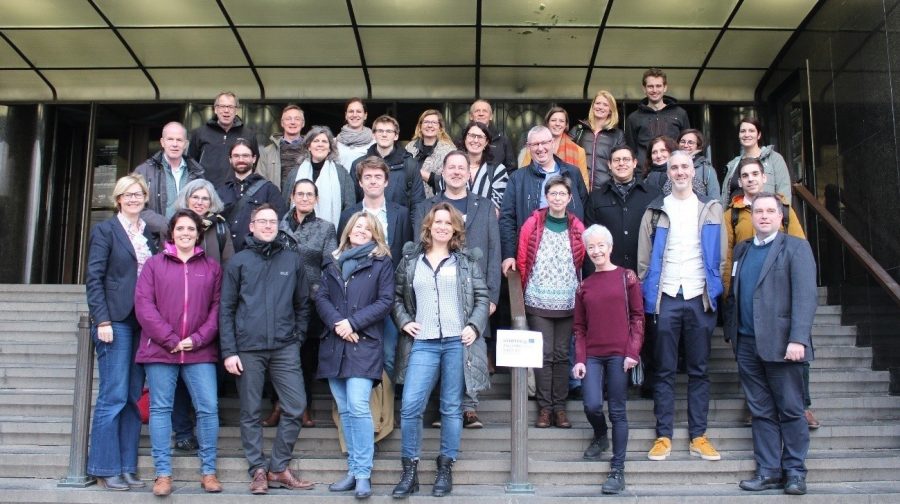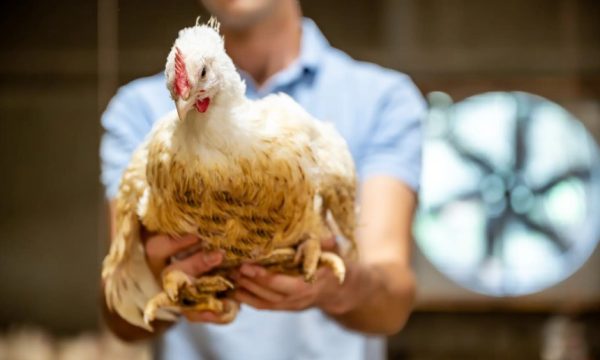Press release Research towards the valorization of seaweed and microalgae as food on the European market

Sustainably grown algal biomass can play a vital role in feeding the world by 2050. However, consumers in Europe are not used to eating seaweed and microalgae and food producers lack a reliable supply, which slows down innovation in the value chain. Twelve Belgian, Dutch, French and British partners aim to tackle this with ValgOrize, a 2 Seas Interreg project just launched in Ostend.
By providing insight into the factors affecting taste as well as texture, flavour and colour, ValgOrize will determine whether altering taste during the different production phases is possible and feasible in real-life companies. It will also create an open platform for scaled up cultivation of high quality, safe algal biomass for the European food and feed industry.
Coordinator Johan Robbens (ILVO): “Europe needs more sustainable food, food producers need a consistent and reliable supply of biomass, and consumers want food that tastes good. ValgOrize will close that gap.”

Algae can play an important role in the world food challenge
To maintain current consumption trends, the world must produce 50 to 70% more food by 2050. Fully 70% of the earth’s surface is covered with salt water, holding a largely untapped potential for the production of food. Hence, the European expert High Level Group recently published an opinion recommending to give more priority to mariculture, in particular to the sustainable cultivation of marine organisms like seaweed and algae. This type of food production puts no claim on agricultural land and uses no fresh water – both scarce resources.
In 2015, world production of algal biomass was 31 million tons. Most of that production originated from Asia with only 1% from Europe. Clearly, Europe must make a major effort to catch up. Not only because of the potential value of the algal market – an estimated 6.6 billion dollars – but also because algal biomass import from Asia doesn’t always meet European food safety standards. At the same time, many European countries allow wild harvesting of seaweed, an unsustainable practice. Last year an estimated 366 million kg of seaweed was harvested in nature without replanting, which jeopardizes its ability to reproduce. Moreover, the quality of this harvested biomass is often low and unusable for professional food producers.
Johan Robbens (ILVO): “ValgOrize therefore wants to stimulate sustainable, controlled cultivation of high quality, safe algal biomass that meets the requirements of the European market.”
Optimizing the taste of algae to match the European taste pallet
Worldwide, around 90% of seaweed and algae is used for food purposes. In Europe that is only 9%. Algal biomass contains many essential components like proteins, amino acids and carbohydrates. It can be used fresh or dried as an ingredient in processed food or as a side dish. However, in Europe, seaweed and microalgae are associated with biofuel, feed and other low commodity uses… but not with good tasting food.
In the next three years, the project partners of ValgOrize will profile and characterize the taste features of globally popular species of seaweed and microalgae. This will increase knowledge about the wide range of flavours in algae, making it accessible and more interesting for food producers to integrate algae into their recipes. Moreover, the scientific partners will aim to determine which factors influence taste and flavours, as well as texture and colour. Among other things, they will look into profiles of amino acids, polysaccharides, volatile compounds and pigments. By varying the amount of turbulence in the water, the quality and quantity of light and the availability of nutrients during cultivation, they will also examine how those parameters can be altered in the seaweed and algae. They will focus only on measures that are feasible in real-life farms and processing companies.
Safe, nutritious and sustainable with zero waste
Besides the taste parameters, the project partners will analyze the chemical and microbial safety as well as the nutritional composition of algal biomass. They will also develop and test new technologies for efficient growth, non-invasive harvesting, cost-effective processing, shipping and long term storage of seaweed and algae without compromising the quality.
A scoring system will be developed to evaluate the overall sustainability of the process, focusing on circularity and zero waste. The main goal of ValgOrize is the valorization of seaweed and algae in food. However, if specific compounds are extracted, the residual fraction could be used as feed. Feed trials with laying hens and broilers will assess the effects on chicken growth and egg quality. Other by-products that cannot be valorized in food or feed will be used for biogas production, thus guaranteeing zero waste.
Deliverables: open platform, two demo plants and investment roadmaps
ValgOrize brings together the expertise of twelve diverse European project partners. Their interdisciplinary expertise will be used to create an open platform for the algal sector in the 2 Seas area. Overall, the project will provide insights into the possibilities for local cultivation, processing and upscaling, giving food producers access to a reliable and consistent supply, which in turn provides consumers with safe and tasty algal products.
At least two demo plants will be set up: one for seaweed and one for microalgae. Based on a feasibility study and market exploration, an investment roadmap will be developed for each algal source. This roadmap will describe the investment needed to scale up production from pre-commercial to the commercial stage. Since market acceptance is a primary focus, stakeholders will be involved throughout the project. For instance, every 6 months a stakeholder event will be organized in a different region and an electronic newsletter disseminating the project results will be published. By involving relevant stakeholders, ValgOrize aspires to encourage investment and enhance the development of a European algal value chain.
About the project
ValgOrize was launched in February 2019 during a stakeholder meeting in Ostend, Belgium. The closing stakeholder event will take place at the end of 2021 at NIOZ, the Netherlands.
The 12 project partners of ValgOrize are ILVO (coordinator), VITO, NIOZ, HZ University of Applied Sciences, Stichting Noordzeeboerderij, Zeewaar B.V., ULCO, Université de Lille, University of Greenwich, Marine Biological Association, Texel Saline B.V. and Nausicaá.
The 11 observer partners are Flanders’ FOOD, Aquimer, POM West-Vlaanderen, Unilever, De Blauwe Cluster, Koninklijke Euroma, Provincie Zeeland, WWF, European Biogas Association, Rijkswaterstaat and Provincie Noord-Holland.
This project has received funding from the Interreg 2 Seas programme 2014-2020 co-funded by the European Regional Development Fund under subsidy contract No ValgOrize 2S05-17.



